Just someone with a passion for all storytelling mediums. I use this blog to write about what I'm passionate about and share it with other people.
151 posts
Catra And Glimmer - Moments Of Truth
Catra and Glimmer - Moments of Truth
The episode “moment of truth” is a major turning point in both Glimmer and Catra’s arcs. They both get their own moments of truth in the episode, but both are framed very differently despite the episode making it clear they both made the wrong choice.
First up is Glimmer. There are two scenes in this episode that can be viewed as her moment of truth. The first is when she initially goes to shadow weaver who persuades Glimmer to free her through the promise of power and the second is when Glimmer actually takes Shadow weaver’s hand to teleport everyone to the fright zone.
For the first one shading is the biggest motif used. The more glimmer considers shadow weaver’s offer the more bathed in shadow she becomes. Glimmer is partially covered in darkness and partially covered in light. Bow is shown on her left completely covered in light while shadow weaver is in the shadows on her right. This is reminiscent of the angel and devil on someone’s shoulders.

And in this case the devil on her shoulder wins. Shadow weaver tells Glimmer that she has near limitless potential and guarantees she can help Glimmer obtain power. This is ultimately what gets Glimmer to free shadow weaver, step into the shadows, and take her hand.


The second instance and the one that is framed the most as Glimmer’s moment of truth comes when she is on the rooftop and makes the final decision to take shadow weaver’s hand to teleport everyone into the fright zone. The entire scene is framed very sinister using dark colors to emphasize this point. The music called “moment of truth” swells as shadow weaver holds out her hand and Glimmer takes it. Glimmer doesn’t know this is her moment of truth. She doesn’t know that she is making the wrong decision, but the audience does.


Catra’s is framed as the exact opposite.The lighting is much brighter and the music quiets when she pulls the lever.

The same music that played during Glimmer’s moment of truth plays during the buildup to this moment not for the actual moment. Catra knows her decision is wrong and I believe this was framed from Adora’s perspective. This was a chilling moment of realization for Adora. This is shown through the quiet music. Adora is shocked, everything outside of this moment is being blocked out and the brighter lighting is used to similar effect and emphasize her realization. In this moment any hope that she had of being able to personally get through to Catra was squashed. Catra made the decision to pull the lever in spite of Adora’s warnings. The look of horror on Adora’s face tells the audience all they need to know about how this moment effected her.

-
 marcodiaz324 liked this · 1 year ago
marcodiaz324 liked this · 1 year ago -
 amstergreen liked this · 2 years ago
amstergreen liked this · 2 years ago -
 bbtlk reblogged this · 2 years ago
bbtlk reblogged this · 2 years ago -
 bbtlk liked this · 2 years ago
bbtlk liked this · 2 years ago -
 adora-blypretentious liked this · 2 years ago
adora-blypretentious liked this · 2 years ago -
 goragnarokw1 liked this · 2 years ago
goragnarokw1 liked this · 2 years ago -
 mandyb96 liked this · 3 years ago
mandyb96 liked this · 3 years ago -
 ohhhoneyy liked this · 3 years ago
ohhhoneyy liked this · 3 years ago -
 bethechange12 reblogged this · 3 years ago
bethechange12 reblogged this · 3 years ago -
 bethechange12 liked this · 3 years ago
bethechange12 liked this · 3 years ago -
 twilightdusk239 liked this · 4 years ago
twilightdusk239 liked this · 4 years ago -
 fantasystar14 liked this · 4 years ago
fantasystar14 liked this · 4 years ago -
 bellaire26 liked this · 4 years ago
bellaire26 liked this · 4 years ago -
 trvalka liked this · 5 years ago
trvalka liked this · 5 years ago -
 jods-duplicitous-sluts liked this · 5 years ago
jods-duplicitous-sluts liked this · 5 years ago -
 golden-redhead liked this · 5 years ago
golden-redhead liked this · 5 years ago -
 jtj207 liked this · 5 years ago
jtj207 liked this · 5 years ago -
 amphibiainwartwood liked this · 5 years ago
amphibiainwartwood liked this · 5 years ago -
 satanic-artichoke liked this · 5 years ago
satanic-artichoke liked this · 5 years ago
More Posts from Battlekidx2
Breaking Down Catra’s Breakdown in Fractures
I really love Catra’s breakdown scene. Every shot has a purpose and meaning behind it and so does the music. I don’t think there was a wasted moment.
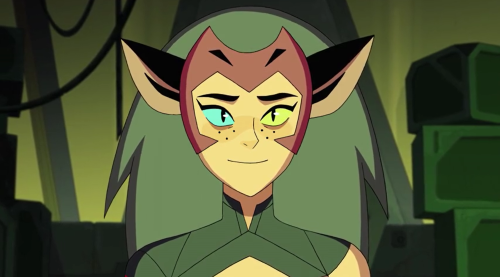
It starts on a closeup shot of her face making sure we can’t really see her surroundings and it’s clear from the get go that her smile and words don’t completely match up with how she feels by the obvious bags under her eyes. There’s more going on here.
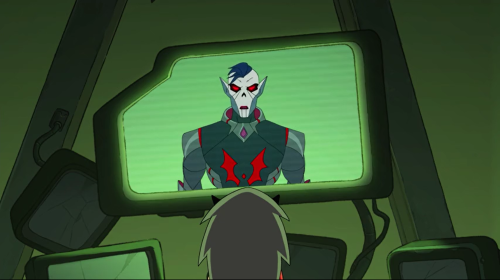
Then it cuts to a shot of the screen with Hordak on it. There is a small screen in the lower left corner that is cracked once again hinting at everything not being “under control”. The cracks in Catra’s facade are becoming harder to hide from the people around her and the full extent of her deteriorating mental state is hidden from the audience.
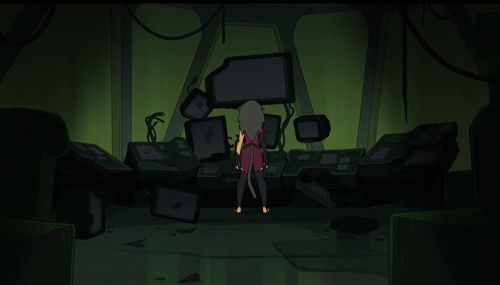
The transmission ends and immediately the camera zooms out to reveal all of the destruction around Catra. The music swells to what is a sinister note then fades to a quieter decidedly more tragic tune. The full extent of Catra’s emotional decline isn’t shown until Catra is completely alone. Catra is framed rather small in comparison to the large, destroyed room. Her pain is bigger than she can handle and everything is starting to become collateral.
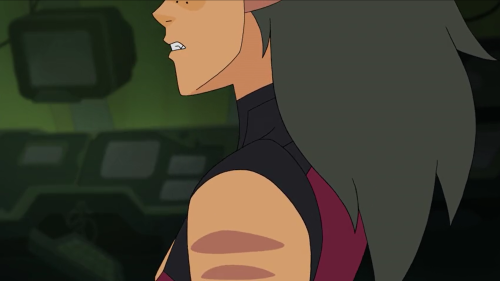
The shot changes to a closeup view once again but this time it’s of Catra’s profile from the middle of her chest to the bridge of her nose, her eyes are out of frame. Catra removes her mask right now both literally and metaphorically, but we still can’t see her eyes. Her full emotions aren’t completely clear yet. We’ve only seen the destruction and anger.
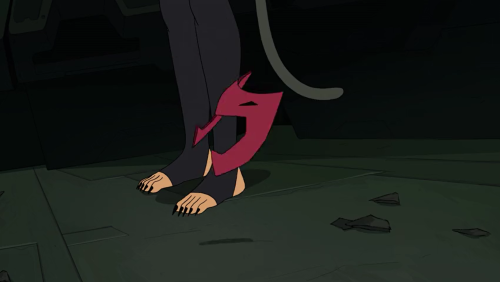
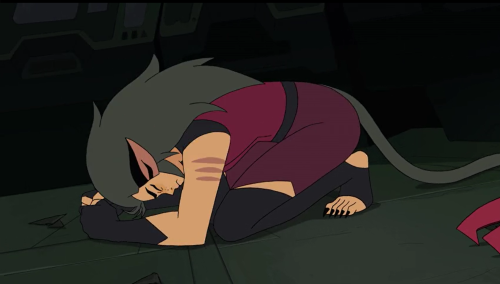
The mask falls to the ground and Catra quickly follows. She falls to her knees with her head bowed to the ground and starts crying.
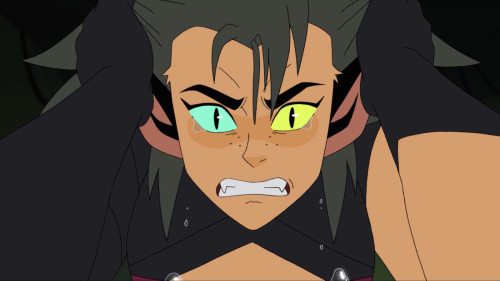
It cuts to her face and we finally get to see her eyes again and all we can see is her emotional anguish. The sad/tragic music swells as Catra’s breakdown continues mirroring the outpouring of emotion. It went from soft when Catra initially removed her mask and the more Catra’s facade slips the louder the music gets until the facade is completely gone and the music crescendos. The shot is a close up, nothing else is in frame. Catra is so alone and in denial that her real feelings, the sadness and pain, can’t be seen by anyone else. She makes sure that it can’t be seen by anyone else. All anyone else will see once this is done is the outward destruction.
This whole scene is so powerful from the framing, to the music, to the dialogue, to the animation. Everything about this scene is amazing. It’s framed so tragic. This is Catra’s low point. She is hitting her rock bottom.
The Tragedy of Dororo (2019) - Finding the “Lack”
I just finished watching the 2019 anime adaptation of Dororo and with the final confrontation between Hyakkimaru and his father as well as the revelation that follows I was struck with how utterly tragic the story was. Daigo realizes that Hyakkimaru was supposed to grow up to be a great ruler and bring about the prosperity and peace that he desired and his deal with the demons actually destroyed the possibility of that lasting prosperity.
All of the suffering that we saw the characters go through could have been avoided. In the end no one was really right. Everyone lacked something that prevented them from making the right choices. For Daigo it was patience and faith, for Hyakkimaru it was his body and understanding, for Tahomaru it was love and support. Every choice made by the characters was driven by their “lack”. And it wasn’t until they understood their “lack” that they were able to see what they truly needed to do, or in Daigo’s case what he should have done. It all becomes clear in the end, but by that point everything has literally and metaphorically burned to the ground.
Hyakkimaru’s journey was especially poignant after that revelation (at least to me). We see his struggle from start to finish, we see him come to care for Dororo, we see his humanity, but we also see his lack be the driving factor for his “inhumanity”. In the episode “Story of the Nue” we see how far Hyakkimaru has come when he gets Dororo food and wants to hear all of her stories. At this time he has found something he cares about more than getting his body back, but throughout the course of the episode we also see how that new care and love can also drive his descent. He is increasingly desperate to save Dororo and can’t because of the limits of his prosthetics which shatter with the effort. This is a sort of breaking point because before he didn’t have a real reason to get his body back other than just wanting it because he believed it would fill his lack, but now he has a driving factor. To get his body back so that he can protect Dororo which leads to his intense desperation and breakdown when he doesn’t receive anything for defeating the Nue. Dororo started to fill Hyakkimaru’s lack. Hyakkimaru mistakenly believed that his lack was his missing body, but in reality it was his connection to people and his understanding of others. Once he makes that connection and is able to see others for what they truly are “human” instead of “others in his way” he is able to become the man he was destined to be.
The connection between what Hyakkimaru believes to be his lack and what really is his lack is interesting. Hyakkimaru not being able to understand others and how they are all like him (human) stems from his lack of a body and senses, but it is his fundamental misunderstanding that getting his body back won’t fix his lack that makes his quest misguided.
The tragedy and pain that Hyakkimaru felt could have been avoided if Daigo’s lack was something different, but because of it he was forced through this crucible and the people were left without the leader that was meant to bring them prosperity.
The story of Dororo is fascinating because of this. What could have easily been adapted as the tale of Hyakkimaru valiantly fighting through his handicaps to take down the evil demons and his irredeemable family (like the original manga) was turned into a much more tragic tale where everything is in shades of grey and the theological ideas of the time period were addressed with much greater thought. Dororo is a story of filling the lack within ourselves and that it sometimes doesn’t happen until it's too late. This struggle felt very human and hit me harder once it was all over.
On a side note: I highly recommend this series. I was glued to the screen from start to finish and really hope everyone gives it a chance.
Adora, Catra, and Glimmer and their Relationships to Destiny
She-ra covers a lot of topics in surprising depth, but the one I want to talk about right now is it’s dissection on destiny. It takes a long hard look at the topic through it’s three female leads Catra, Adora, and Glimmer. It’s surprising how much overlap there is and how each character is used as a direct foil to the others in regards to the show’s exploration of destiny.
Adora

Adora has a complicated relationship with destiny. Throughout the series until the series finale she has continually followed false destinies first with shadow weaver and the horde then with she-ra and light hope then finally with the failsafe. Adora has had false destinies forced upon her and she feels she has no way out, that she can’t refuse the call. She actually feels secure in knowing she has a destiny. It’s a path to follow, a purpose, and without a purpose what’s the point of her? At least that’s what she believes. She places her entire self worth on what she can do for other people to the point of self destruction. She is willing to answer the call no matter the cost even if it’s not what she wants. But Adora was never meant to succeed in any of her false destinies. It was always someone else using her for their own gain. All of her sacrifice would be for nothing.
Her breaking the sword in destiny isn’t her refusing the call. She believes her purpose is to protect etheria and those she cares about and by breaking the sword she is “killing” a part of herself to answer that call. Just like how she left the one person she cared most about and her entire life behind to answer that same call in the pilot. Just like her taking on the failsafe and accepting her, what she believes to be, inevitable death. In a weird way every time she rejects the call from someone else (shadow weaver, light hope, the first ones, etc) she is leaning harder into the idea of her purpose and sacrifice defining who she is, which is in and of itself a false destiny and self fulfilling prophecy that almost gets Adora killed time and time again.
Adora is never given a choice in any of her other false destinies (in fact she was actively conditioned to believe that she had no choice by shadow weaver and light hope. Adora was made to believe that she was meant to answer a higher call and neglect her own needs and wants) so she feels that the call to protect etheria and her friends isn’t a choice either. To Adora it’s the reason she exists. She is what she can do for other people. She is stuck in her own cycle of service and sacrifice that was forced upon her by shadow weaver and others.
Catra

Catra, like Adora, follows a destiny she thinks has been forced upon her. She feels the role of the villain is her only choice. At first it was a role forced onto her by shadow weaver then it became a way to prove to everyone she felt hurt her and didn’t believe in her that she was capable, that she was strong, but then the farther she went the more she believed that there was no other path for her. She felt she had to continue because she had gone too far to turn back and so she had to make something of it all. She felt she was proving shadow weaver, the source of her trauma, wrong by gaining power and relevance within the horde and etheria, but also that she was proving shadow weaver right, that she was a horrible, good for nothing person that only hurts those around her. She felt trapped within this destiny (the cycle of abuse and violence).
She continues to double down and claw her way up to the top which culminates in her defeat of Hordak. She is the sole leader of the horde, she has clawed her way up and defeated all of those that were above her, and yet she has lost everything. She has lost everyone who ever actually cared about her and to make matters worse the power she strove after all these seasons was decimated in one fell swoop by Glimmer mainly because of her own actions (though Glimmer’s plan was smart). Glimmer would not have been successful if Catra hadn’t overworked the troops, been lying to Hordak, sent Entrapta to beast island, pushed Scorpia away, put faith in double trouble who she knows is hired help who knows no loyalties, and taken even a little bit of care of herself. It’s in this moment where she’s at her lowest that she is given the brutal and (only partially true because shadow weaver was definitely not pushed away by her. Shadow weaver just sucks.) eye opening speech by double trouble.
Catra has fallen victim to her own self-fulfilling prophecy just like Adora does during the series. Both had these cycles/destinies forced upon them by shadow weaver and her abuse and can’t see a way out. They feel they have to continue down their respective paths of self destruction because it’s their only choice
Glimmer

Glimmer isn’t like Catra or Adora. She never had a destiny forced upon her, but she wanted one. She wanted to be the hero, to save all of etheria. Glimmer wants glory and power. This isn’t to say that Glimmer is a bad person, far from it in fact, just that she has shortcomings that blinded her to the truth: that she didn’t have a destiny, but that doesn’t make anything she does less meaningful than what Adora does.
A large part of her season 4 arc is about her clashing with Adora over her feeling as though Adora is failing in her destiny and won’t take the necessary steps to win, but that she can. Adora isn’t willing to use the dirty tactics to beat the horde, but she is. Adora isn’t willing to use all of her resources like shadow weaver, but she is. Adora isn’t willing to fire off the heart of etheria, but she is. Because of all of this Glimmer starts to believe in her own way that Adora is failing as the hero and in her destiny and if that’s the case Glimmer will take that destiny. Adora is meant to finish off the horde by activating the heart of Etheria and since she won’t Glimmer takes that destiny from her. There is a conflicting mix of anger, desperation, pain, and pride that push her to do this, but it still all ends with her going to light hope to take Adora’s destiny for herself and her using Catra’s tactics to take the horde down from the inside.
She in a way takes the forced destinies of Catra and Adora on for herself. She believes, like Catra, that she has to make it all worth it, all the loss her and her people have gone through, which is what leads her down her spiral like how it led Catra down her spiral this same season.
How it all concludes in the 5th season

As I’ve said above all of their struggles with destiny come to a head in season 4’s finale. Glimmer in taking on the destinies of others ends up making a grave mistake that almost ends the world and universe. Adora effectively “kills” she-ra to answer her calling to protect etheria. Catra has climbed her way to the top of the horde, but has lost all the power she thought she wanted and had to strive for at the same time. All of these in their own way subvert the expectations of each character and force them to take a hard look in season 5 at themselves and their destiny.
Catra is forced into a situation where she is effectively powerless and is faced with the same decision she had at the end of season 3. This time she decides to take action against destroying the universe. She hasn’t erased her mistakes, but has shown that she has grown from them. In this decision she has started to break free from the cycle she was stuck in. It isn’t until the episode “Taking Control” that she fully starts to break the cycle. She makes the decision to live and face her mistakes instead of die or run from them. This is Catra breaking free from her destiny. It’s through facing her mistakes that Catra is able to grow and become the person she always was instead of the person she felt she had to be. Catra’s struggle with destiny was always that she felt she had to be someone else, that it was the only way to protect herself and prove others wrong. It’s through actual acceptance, care, and compassion shown to her that she is able to break free from this mindset. Obviously the journey isn’t over, it’s something she will always have to work on, but she has made significant strides and wants to continue making them. Her destiny is her own choosing.
Adora is a bit more difficult because she backslides in a big way in the fifth season. She starts out the season having difficulty adjusting to no longer having her destiny as she-ra and she seems to come to terms with the absence of this destiny by the time she leaves earth. And in “Save the Cat'' she actively goes against her calling and destiny she believes she has to follow. She puts saving Catra above the universe. She won’t leave the ship without Catra and the odds of her getting out, especially without she-ra, were practically non-existent and she knew this going in. This is the first time in the series that Adora really makes a choice that is for herself not her calling. This ironically is what brings back she-ra, one of her false destinies, but this time she-ra is a manifestation of Adora and her will, not that false destiny. Once Adora returns to Etheria and is faced with the failsafe and shadow weaver she backslides back into a false destiny pushed onto her by shadow weaver. She takes on the failsafe and decides that being sacrificed is a better outcome than letting horde prime get the heart. She is fully prepared to die and Catra sees this. Catra becomes the first person to ask Adora what it is that she wants. Adora can’t answer. Her needs and wants are unimportant next to her destiny. “It was always going to end like this.” To Adora this end was inevitable. But then Catra comes back and decides to stay with her when she activates the failsafe. It’s in this moment of selfless love from Catra that Adora is able to break free from the coffin of her abuse and reach for what she wants. In doing so she is able to break the cycle of service and sacrifice. She has let herself want to live and have a future which is what saves her. It’s what lets her break free from her destiny.
Glimmer is once again different. She doesn’t have a destiny to break free from. But from taking on the false destinies of Catra and Adora Glimmer is able to gain perspective that she didn’t before. She understands to a much greater degree what drove Catra to where she is now. Their similarities are no longer a point of contention but rather a point of connection. The new perspective Glimmer has allows her to reach out to Catra and see the potential for good that she was so adamant didn’t exist in earlier seasons. She’s able to see the shades of grey within people unlike before (ex. “Bad people don’t change” in the price of power). It allows herself to see her own flaws with much more clarity such as her desire for power and glory, jealousy, quick temper, etc and grow. She’s able to see the shades of grey within herself. This also allows her to accept that she doesn’t have a destiny, but her actions are just as important as anyone else’s. It doesn’t negate all the good she’s done or will do. This allows her to find the power within herself to defeat her father and protect all the princesses in the final battle with horde prime. Glimmer isn’t defined by this lack of destiny. It’s an interesting foil to Catra and Adora who always felt trapped within destinies. Glimmer felt trapped because of her lack of one like she was limited because of it, but it’s once she discovers that she isn’t, that she can create her own path, that she’s able to create her biggest positive impacts which is rather fitting.
The Witcher Netflix Review
Netflix’s The Witcher series starts with a bang. Everything within the world comes crashing down. Nilfgard has attacked and overtaken Cintra and Ciri has barely escaped with her life with the goal to find the man her grandmother told her about Geralt of Rivia. The first episode immediately pulled me in and I couldn’t wait to see what would happen in this story and world. The final two episodes made everything come full circle and I was left wanting more. Especially with the cliffhanger ending that episode eight left off on.
The series juggles three timelines with Ciri, Geralt, and Yennefer at the focus of each of their own timelines. Ciri’s timeline happens mainly after the fall of Cintra. Geralt’s timeline chronicles how he came to become Ciri’s fate. And Yennefer’s tells the story of an unwanted and powerless girl becoming a powerful and confident sorceress. All storylines were well told and got me to care for each individual character. I cheered when they succeeded and was sad when they failed. All three were well cast and now that I’ve seen their portrayals in the show I can’t imagine anyone else playing these parts.
Netflix clearly didn’t take any shortcuts with the production of the Witcher. All of the technical aspects look top notch. The CGI looks fantastic for a television series.The cinematography is also very gorgeous. The timelines and places are easily distinguishable from one another through lighting, filters, and set design. I never got one place mixed up with another.
I did think there were a few moments that were slow. They probably could have cut some content to tighten up the episodes a bit more. Episode five was the weakest of the eight episode series, but it did contain some relationship building that did affect the characters moving forward. Overall these weren’t that major because the show typically moved at a pretty brisk pace with important story of character beats happening fairly often.
I recommend this show for both fans and newcomers. Fans will enjoy seeing their favorite characters adapted for the screen and newcomers will not be lost in the world and will come to understand the characters and their stories well.
This is easily the most personal thing I’ve ever posted on this site, but it’s something that I really need to get off my chest. The last season of she-ra dropped and since then I've kind of been letting this fester. This show hit me a lot harder than I expected because I felt so validated in more ways than I was expecting. In ways I feel like I’d never been validated before.
I don’t really know why this show makes me so emotional whenever I think about it, but I do know that I haven’t connected to characters as deeply as I did Catra and Adora in any show other than Korra in the legend of Korra (another show that makes me deeply emotional). I understood their anxiety, depression, anger, fear, and desperation. I understood their darker emotions so well and seeing them finally be able to be happy and move in a healthier direction after all their struggles gave me hope. And it’s weird but it also felt so cathartic. I know a lot of people will both understand and many people won’t and I’m so mixed up because I’m not entirely sure how I can understand them so well. How come I felt the same emptiness and holes in my life that they did? How come I have the same struggles with lashing out and anxiety? How come I felt so understood by cartoon characters and yet never with real people? The root of their struggle is so different from mine or at least Catra’s is. I think my experience was a bit similar to Adora’s but even then my father has turned around and has been really trying to be better and more supportive so it is still different. So why do I get so emotional? My parents always said my life was so great, that I had so much more than other people, that I should just be grateful, but I always felt so sad and, if I’m being honest, like they didn’t like me. I don’t know if that’s true, but it felt that way. Everything I liked and showed interest in was weird and “corrupting” me (and I mean things like anime, comics, and cartoons). I would get in trouble from my mom for my brother and sister acting out because I was a “bad influence”. Whenever I would really piss my father off he would throw and kick my things, yell at me for extended periods of time, and take all of my possessions except for my bed claiming he owned everything as long as it was under my roof and if I didn’t learn to get in line I would never get anything back. When my brother and I would go to stick and puck for hockey I would be sent to the other end on the ice so my dad could work with my brother alone. And if I’m being honest there were many instances of “lower tier” physical abuse (not really sure what to call it) where he would shove or drag me around or throw me or pin me to the wall or my bed or throw things at/towards me and I was scared of him. Sometimes when in competition if I was losing and being a sore loser an “accident” would occur and I would end up injured (sprained wrist, busted nose, etc) and it would always be my fault for angering him by being a sore loser. I let my mom know but my mother victim blames and always found excuses for everything my father did and always pinned the blame on me or my siblings. This got worse the farther into high school I got until everything reached its boiling point my senior year and I cut off contact the next year. There were good times and since I cut off contact my dad has made a legitimate and genuine effort to change (my mom pretends those years never happened), but it still hurts and I still question whether or not my pain is valid. I’ve had so many people brush it off that it’s hard to acknowledge that it’s valid. And it’s just new, I think, having female characters being shown on screen having these same struggles and having them validated, but also being held accountable for how they react to their struggles and trauma. It made me feel validated for one of the first times in my life. And I mean really validated because now my father’s words ring sort of hollow after 19 years of not giving me really any validation.
I just really needed to get this off my chest. I’ve never really talked to anyone about this. I’m still so scared that it will be brushed off because the bad times weren’t all the time. Scared of many things really. (If anyone read this and understood these feeling and experience I hope you know you’re not alone)
